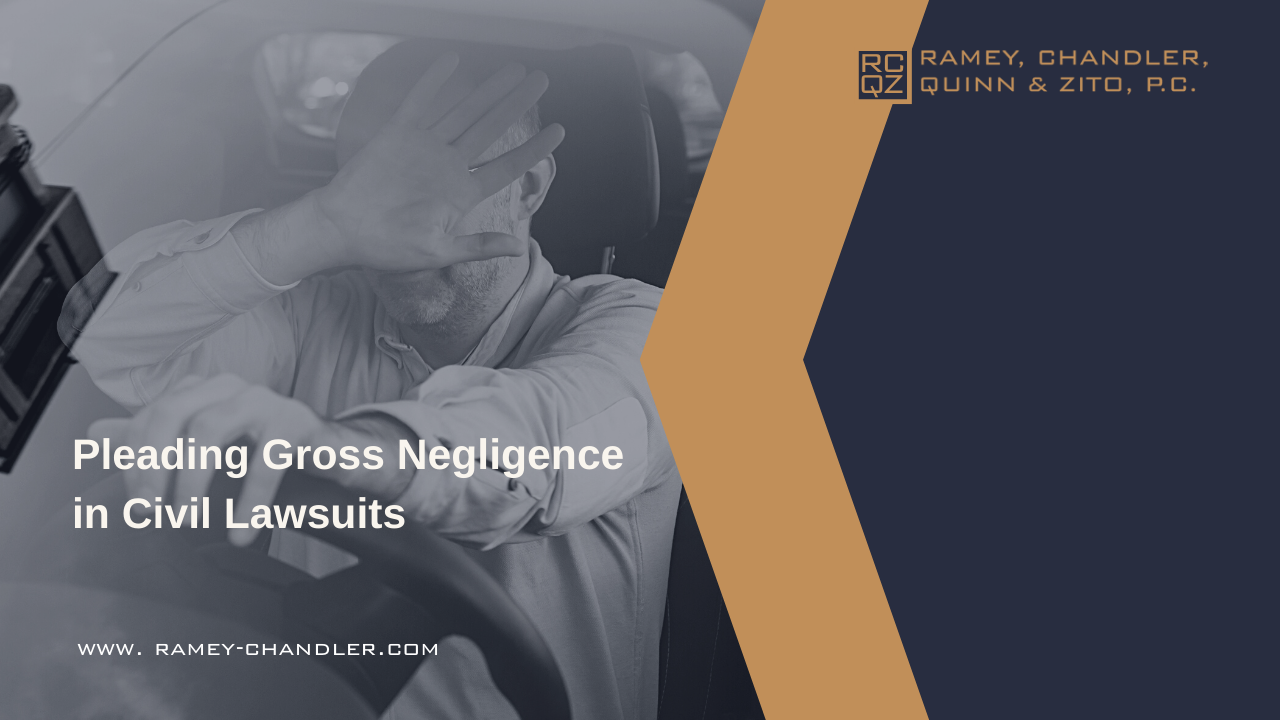Pleading Gross Negligence in Civil Lawsuits
Everyone knows that accidents happen: spilled milk, burnt cookies too long in the oven, wet floor at the
top of a staircase, hairdryer fallen into the bathtub. Based on those examples, delineations exist
between accidents according to how they come to pass, and the risk of harm involved. However, some
of those explanations can be difficult to distinguish. For instance, failing to blow out a candle before
falling asleep for the evening would likely be interpreted as less careless an action than leaving an open
flame on the stove in preparation for dinner and running out for an errand in the interim - both have
potentially disastrous (and equal) consequences, but the former simply feels less dangerous. Despite the
apparent nuance of these differences, the law attempts to draw a clear line that separates two major
categories of actions or omissions.
In Texas’s Civil Practice and Remedies Code, gross negligence is defined as an act or omission, which
when viewed objectively from the standpoint of the actor at the time of its occurrence involves an
extreme degree of risk, considering the probability and magnitude of the potential harm to others; and
of which the actor has actual, subjective awareness of the risk involved, but nevertheless proceeds with
conscious indifference to the rights, safety, or welfare of others. Ordinary negligence, on the other hand,
is characterized and defined by actions or omissions that do not comport with the would-be actions or
omissions of a reasonable person under the same or similar circumstances. These ideas are meant to be
distinct from one another - though related, one the outgrowth of the other into a more egregious fault.
For that reason, gross negligence claims must be accompanied by some indication that the defendant of
such a claim understood the action to pose an extreme risk of serious harm and proceeded with it
regardless - something that separates it from mere carelessness, an extension.
Consider a driver who, in a rush, attempts to beat a yellow light and race through an intersection, only
to end up spun out on the side of the road after T-boning another vehicle that was proceeding through
the opposing green light. It could easily be argued that the first driver acted in a way that does not align
with what a reasonable person would have done in that same situation. Ordinary negligence is almost
certain. The question is whether that rises to the level of gross negligence - did that rushed driver
comprehend an extreme risk of serious harm at the time the decision was made to cross the
intersection? Did that driver decide to throw caution to the wind and lay on the accelerator anyway?
Maybe.
Much clearer is a situation in which the driver approaching an intersection proceeds to put on a
blindfold and step on the gas. However, it is not often that we see any fact pattern laid out in a petition
to support a gross negligence claim being plead, much less one that would be sufficient to sustain a
successful one.
As plaintiffs continue to bring lawsuits that adhere to the “throw it against the wall and see what sticks”
methodology, defendants and their attorneys must be attentive to baseless gross negligence claims.
These claims are very often unsupported and, if unchecked and unchallenged, may come to encourage
the widespread inclusion of such claims to all petitions (particularly because they open the door to the
possibility of a punitive damages award). As a result, we could see a negative effect on the productivity
of settlement negotiations in civil cases, the avenue by which nearly ninety-five percent of all civil cases
resolve. The parties to these lawsuits typically have plenty to disagree about without such a
troublesome addition to the calculus.
By accepting you will be accessing a service provided by a third-party external to https://www.ramey-chandler.com/

